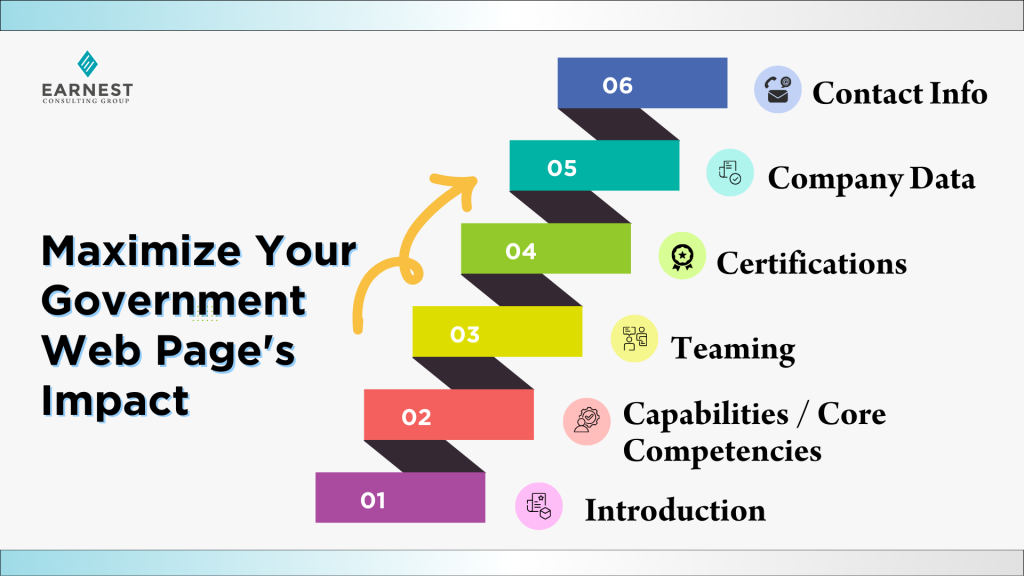Maximize Your Government Web Page’s Impact: 6 Essential Details for Ensuring Effectiveness
July 2, 2024 | Government
Image made in Canva
Government contracting officers are working harder than ever these days. With the government spending more money than it did 20 years ago and fewer contracting officers available to make the awards, companies must do business with them as seamlessly as possible. One fundamental way to achieve this is by making your website clear about your intent to do business with the government and how the government can do business with you. Here are six key elements to make it easy for contracting officers to figure this out.
Introduction
A well-structured government page on your website is essential to effectively engaging potential government clients and partners. Start with a brief company overview, including critical metrics highlighting your experience and past performance.
Capabilities / Core Competencies
Clearly outline your core competencies and capabilities. Summarize your company’s unique strengths and provide a list of products, services, or solutions you offer. Additionally, include quantifiable and qualifiable metrics to support your value proposition.
Teaming
Express your willingness to collaborate with other companies and jointly pursue future opportunities. Emphasize that your success is built on solid partnerships and proactive engagement. Highlight the value of your solutions to teaming partners and explain why other companies should consider you a valuable addition to their team.
Also, include a link to a form created in Google or Microsoft Forms that enables interested parties to submit information about their company, experience, capabilities, and contact details. This will help you develop a database of potential teaming partners at your fingertips.
Certifications
Government customers highly value certifications. Therefore, it is essential to list all relevant certifications at both the corporate and individual employee levels. This will demonstrate compliance with industry standards and government regulations. When referring to certifications, I am not talking about set-aside certifications. I refer to ISO or other certifications such as Salesforce Ridge Partner or Microsoft Gold Certified Partner. Individual certifications may include PMP or ICF, depending on your industry.
Company Data
Provide essential company data in a concise bullet format or table. This information helps validate your business and makes it easy for potential clients to understand your company’s credentials.
Example:
– Legal Company Name:
– DBA Name:
– SAM UEI:
– CAGE Code:
– NAICS Codes:
– SBA Status:
– Contract Vehicles:
If you want to put your respective badge for your SBA status, subtly do so in this section. While it’s tempting to put it everywhere on the website, displaying it in an understated way speaks volumes to your overall business maturity.
Contact Info
Ensure contact information is easy to find. Include the primary contact person’s name, title, phone number, and email address. Don’t use generic email addresses like [email protected] or [email protected]. Also, whatever phone number you include, make it extremely easy for customers to get a hold of you. Don’t put them through a complicated menu or route them to an operator who doesn’t know how to reach you. Ensure your voicemail is set up with your personalized message, and keep it clear so it won’t fill up. One of the worst messages potential customers can get is, “The mailbox is full and cannot accept new messages.” If the phone number you put down accepts text messages, make that known on the page, but ensure you respond to them promptly.
By structuring your government page with these critical sections, you will provide a comprehensive and engaging resource for potential government clients and partners, showcasing your company’s strengths and fostering successful collaborations.
Finally, the placement of your government page is crucial. Do not bury it in a submenu. Put it under the page’s main navigation menu. I’ve heard many reasons from clients why they won’t do that. They range from SEO to not having enough space on the main navigation to ruining the look of the site. I have one response for why they should. It’s the easiest way for government customers to find the info they need.
« Back to Blog Home




